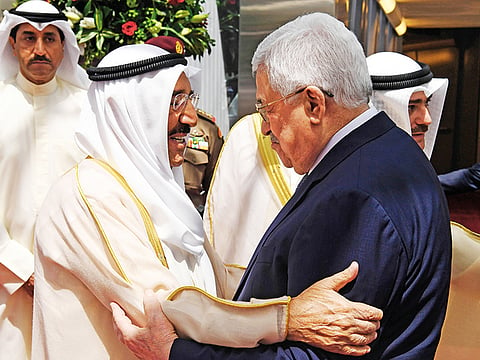180 Palestinian teachers vetted to work in Kuwait
First recruitment of Palestinian educators since 1990

Manama: A total of 180 Palestinians have been shortlisted in a selection process to teach in Kuwait’s schools as the northern Arabian Gulf state prepares itself to take back Palestinian teachers following a hiatus of almost three decades.
Palestinian officials said that 1,173 teachers, including 425 women, had applied for positions in Kuwait.
A Kuwaiti delegation is currently in Palestine sifting through the applications, Kuwait News Agency (Kuna) said.
The shortlisted applicants will go through a written exam to be followed by a personal interview to determine whether they will be recruited, Assistant Undersecretary at the Kuwaiti Ministry of Education Fatma Al Kanderi told the official news agency.
“Kuwait is keen on recruiting Palestinian teachers and we hope that the procedures to acquire the services of the applicants will run smoothly,” she said. The contracts with the successful applicants will be open-ended.
Palestinian Education Ministry Undersecretary Basri Saleh said that the step to accept Palestinians into the Kuwaiti educational system was an important step towards reinforcing cooperation between Kuwait and Palestine.
“This visit marks the establishment of a new era of wide cooperation between the two countries in the education sector and other sectors as well,” he said. “It is also a step forward to highlight the aptitudes of Palestinian teachers.”
The Kuwaiti delegation began its visit on Thursday and will conclude its mission on Saturday.
Palestinian teachers had remarkable contributions to the development of education in Kuwait, mainly during the early days of the nation-building process.
However, the situation of the Palestinians in Kuwait plummeted in 1990 in the wake of a deep Kuwaiti-Palestinian rift following the invasion of Kuwait by Iraqi leader Saddam Hussain.
Iraqi military forces invaded Kuwait on August 2, 1990, prompting the United Nations Security Council to pass Resolution 660 condemning the invasion.
One week later, the Council passed Resolutions 661 and 662 that authorised the use of military force to liberate Kuwait.
The Palestine Liberation Organisation (PLO) and Palestinians in general supported Saddam as a hero who publicly defied the Middle East policy of the United States and threatened to wipe out Israel, in the mould of Egypt’s president Jamal Abdul Nasser.
A deceptive announcement by Saddam that he would withdraw from Kuwait if Israel pulled out of the occupied Arab territories was cheered by Palestinians who openly supported him against the coalition forces.
Kuwaitis felt betrayed by the Palestinian pro-Saddam attitudes and following its liberation in February 1991, Kuwait cut off ties with the PLO, froze its financial backing and expelled a large number of Palestinians from the country.
The wound in bilateral relations started to heal only 14 years later after Mahmoud Abbas, Palestinian president, apologised in December 2004 for the Palestinian position in 1990 towards the Iraqi invasion.
“We apologise to Kuwait and the Kuwaiti people for what we did,” Abbas told reporters after arriving in the state on the first visit to Kuwait by a senior Palestinian since relations were suspended.
Relations have since evolved and Kuwait repeatedly announced multi-million dollar donations to Palestinians and contributed millions to projects supporting Palestinian development.
In 2012, Khalid Al Jarallah, Kuwait’s foreign ministry undersecretary, said that Kuwait and the Palestinian National Authority reached an agreement on re-opening the Palestinian embassy.
In April 2013, Abbas attended the re-opening of the embassy describing it as “a historic moment in the deep-rooted relations between the two countries.”
In his speech, Abbas paid rich tribute to Kuwait, saying that it has hosted thousands of Palestinians and that it fully supported the Palestinian issues.
“We will always recall that the Palestinian struggle was started here and that the Palestinian Liberation Organisation and Fateh movement were born and nurtured here thanks to the Kuwaiti rulers and people,” Abbas said.
In April 2016, Kuwait’s education ministry said that it would be recruiting hundreds of Palestinians to teach Mathematics and science in its schools. The teachers will be hired from Palestine or locally from the Palestinian community in Kuwait, it added.
The announcement put an end to a ban imposed in 1990 on recruiting Palestinians to work in Kuwait.
However, as the education ministry announced its decision to end the hiatus, the interior ministry said that the Palestinian passport was not enough to grant them the residence permit that will allow them to stay and work in the country.
The legal hurdle was cleared one month later after the ministry said it would request Palestinians to present their passports as well as their laissez-passers when they apply for the residency permits.
“We need the laissez-passer because it allows us to deport the expatriate home in case he breaks the laws of Kuwait,” a ministry official said. “It is the guarantee that we need as a security department so that we do not face the issues we faced when dealing with Palestinians carrying Syrian, Jordanian or Egyptians documents who were not, upon their deportation from Kuwait, accepted back by the countries that gave them the documents.”


